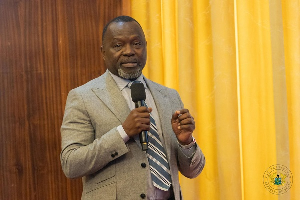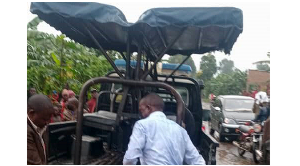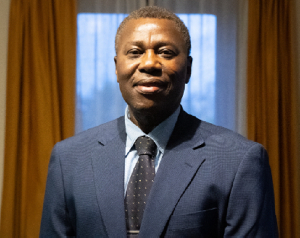*HELP FOR THE HELPLESS AT LAST*
(Feature by Francis Ameyibor, Development Communicator)
Accra, Oct 22....The popular calypso song "Everybody Likes Saturday Night," by Lord Kitchener which translated into an acceptable lifestyle for most Ghanaians years back has now become a nightmare for other classes of people.
Most Ghanaians lived under the vague thought that after a long spell of work, hustle and bustle during the week, it was important to restore the long-drawn-out energy of the body, on Saturday nights with amusement at night clubs, restaurants, theatres, beaches or hooked to other nocturnal activities.
Unfortunately for a large contingent of Ghanaians, every night is a nightmare as a recent nocturnal expedition I undertook at Tema Station, a portion of Accra New Town, Adabraka and Makola Market after watching the Maternal Health Channel (MHC) story of female porters “kayayei or kakayo” on the tough streets of Accra and other cities.
The nocturnal expedition exposed me to the horrible lifestyle of these special classes of Ghanaians not only on Saturday nights but on all the other days of the week as well. They carry heavy load during the day and sleep under unbearably conditions in the night. Is there any joy in life? What is the fruit of hard labour?
Most of this special group of people, in the night, transformed these market centres into night clubs, video theaters, and self-contained apartments. All that one needs is a mosquito net and then a stall is converted into a self-contained room whilst the tables used during the day for selling become beds.
The question is why would anyone leave their homes and families and travel to an unfamiliar, unfriendly city to sleep on the streets, suffer various abuses including rape and violent robberies, be forced to undertake grueling and sometimes demeaning work, and still persist in the same situation for years on end?
The recent exposure by the MHC of the story of female porters “kayayei or kakayo” on the tough streets of Accra and other cities, is a complex one. Their adversities are as varied as the reasons why they left their homes and continue to make out a livelihood under such dire circumstances.
The MHC broadcasted series of programmes on Kayayei in Accra, with a special focus on how (and if) they accessed maternal health care. Touched by their plight Dr. Ebenezer Appiah-Denkyira, Director General of the Ghana Health Service (GHS) picked up the issues and subsequently decided to team up with MHC to help chart positive ways forward.
Dr. Appiah – Denkyira promptly set up a city - wide health and welfare committee which would include representatives from the police, social welfare, health providers, and NGOs under the auspices of Ghana Health Service.
This unique partnership represents a great chance to provide lasting solutions to the challenges posed by this critical sector of public health care. The committee would meet every three months to evaluate progress made.
These steps are all very important in reducing the incidence of maternal deaths, and greatly improving the wellbeing of Kayayei in Accra.
They certainly do not automatically erase what the Kayayei say are the prevailing conditions which occasion their existence on the streets in Accra; harsh economic conditions in their hometowns, pervasive traditions which they reject like forced marriages, etc.
Even as the debate on how to appropriately deal with the burgeoning marginalized population of Kayayei communities in our cities, Dr. Appiah – Denkyira’s initiative is a truly gratifying beginning. This should develop into providing a comprehensive solution to the multi-faceted difficulties faced by the hardworking queens of our markets and streets, the Kayayei.
Other interventions to support the general wellbeing of Kayayei includes posting a representative nurse to each Kayayei community whilst ensuring that all their community leaders have the phone number for their assigned nurse for easy and frequent communication.
These nurses according to GHS would carry out outreach services in their localities, educating them on several public health issues, as well as attending to their medical conditions. They would also serve as a liaison between Kayayei communities and designated midwives.
All pregnant women and children are also going to be registered to facilitate service delivery of maternal health care.
In cases of medical emergencies, these liaison nurses would ensure that all relevant procedures are efficiently executed including calling for an ambulance, giving prior notice to the receiving health facility, etc.
All Kayayeis are going to be promptly registered on the National Health Insurance Service, and their children immunized.
Some of the Kayayei in an interview said they do not go to hospitals when they are sick because they are unnecessarily insulted by medical staff, and are sometimes even refused care because they are shabbily dressed.
This blatant discrimination against Kayayei in some health institutions was personified in a story given by Ms Esther Worae, a midwife from Marie Stopes International who works with Kayayei communities.
According to her a Kayayei woman and her family were denied access to her baby after delivery, even after repeated requests.
After a number of days and with firm insistence from Ms Worae they were eventually presented with a dead baby. There was hardly any adequate documentation to ascertain if that was really the Kayayei’s child or not.
Ms Worae said they left the hospital deeply aggrieved, with no clue as to what had really happened to her child.
Ms Betty Blay Ackah MHC Publicity has noted that urgent need for adequate shelter, as their sleeping on the streets rendered them helpless to conditions like bad weather, mosquitoes, unsanitary spaces for food preparation, and rapists.
Now how do we sustain the help to these unfortunate brothers and sister called Kayayei? How do we as a nation uproot the problem? Reduce incidence of internal unproductive migration to seek for non-existing greener pastures only to end up on the streets?
Opinions of Wednesday, 23 October 2013
Columnist: Ameyibor, Francis














